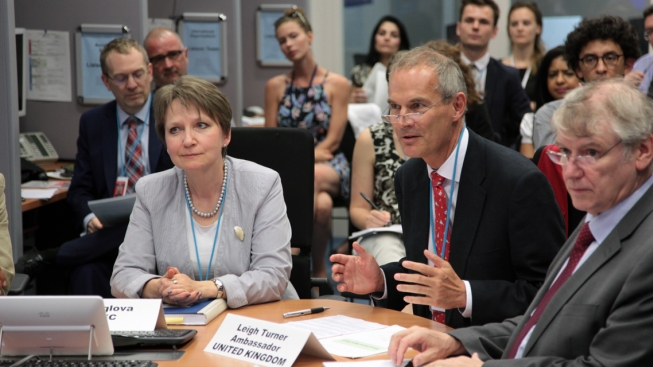Nuclear Emergencies at Sea: Experts Practice Emergency Communication Procedures

A simulated table-top exercise took place on 28 June 2017 at the IAEA headquarters. (Photo: W. Gruenwald/IAEA)
Experts from France, Ireland, Japan, Portugal, Spain and the
United Kingdom took part in a simulated table-top exercise on 28 June to
practice their transboundary cooperation and communication in
emergencies relating to nuclear materials being transported by sea.
Twenty-four participants took part in a fictional scenario played out at the IAEA’s Incident and Emergency Centre (IEC) in Vienna involving a fire breaking out on a ship transporting nuclear waste. Through the use of ‘injects’ which reflected how real time events might unfold, the participants were asked to assess given information, respond, and describe their respective decisions and actions to the group.
“Safety of maritime transport of nuclear materials, as well as the preparedness to respond to emergencies, are the responsibilities of States, and given the potential effects such an incident would have on several countries, close coordination and communication between the authorities of affected countries is crucial,” said Elena Buglova, Head of the IEC.
In the early 2000s Coastal and Shipping States, including those involved in last week’s table-top exercise, set up a Coastal State-Shipping State Dialogue as an informal consultation and information exchange mechanism relating to nuclear maritime transport. The table-top exercise was a model on which to test international cooperation through the Dialogue.
“Exercises like this help build confidence and promote transparency among countries that have to deal with shipments of nuclear material,” said Ambassador Pedro Moitinho de Almeida, Permanent Representative of Portugal to the International Organizations in Vienna and Chair of the Dialogue. “This allows us to practice emergency response arrangements and helps us to put our national plans into context with those of our international partners.”
Ambassador Leigh Turner, Permanent Representative of the United Kingdom to the International Organizations in Vienna and incoming Chair of the Dialogue, said: “The exercise showed the importance of communication and cooperation between States during a nuclear or radiological emergency. The scenario helped us to evaluate national communication arrangements and to understand the needs of our partners.”
The table-top exercise is the latest in a series conducted by the Dialogue between Coastal and Shipping States, with the previous exercise held in 2015. The outcome of the exercise will be used to improve future communication among Coastal and Shipping States and secure safe procedures during the maritime transit of nuclear material.
Ambassador Mitsuru Kitano, Permanent Representative of Japan to the International Organizations in Vienna and former chair of the Dialogue, said: “The Dialogue has progressed in enhancing international cooperation and information sharing in order to build confidence in nuclear maritime transport.”
Twenty-four participants took part in a fictional scenario played out at the IAEA’s Incident and Emergency Centre (IEC) in Vienna involving a fire breaking out on a ship transporting nuclear waste. Through the use of ‘injects’ which reflected how real time events might unfold, the participants were asked to assess given information, respond, and describe their respective decisions and actions to the group.
“Safety of maritime transport of nuclear materials, as well as the preparedness to respond to emergencies, are the responsibilities of States, and given the potential effects such an incident would have on several countries, close coordination and communication between the authorities of affected countries is crucial,” said Elena Buglova, Head of the IEC.
In the early 2000s Coastal and Shipping States, including those involved in last week’s table-top exercise, set up a Coastal State-Shipping State Dialogue as an informal consultation and information exchange mechanism relating to nuclear maritime transport. The table-top exercise was a model on which to test international cooperation through the Dialogue.
“Exercises like this help build confidence and promote transparency among countries that have to deal with shipments of nuclear material,” said Ambassador Pedro Moitinho de Almeida, Permanent Representative of Portugal to the International Organizations in Vienna and Chair of the Dialogue. “This allows us to practice emergency response arrangements and helps us to put our national plans into context with those of our international partners.”
Ambassador Leigh Turner, Permanent Representative of the United Kingdom to the International Organizations in Vienna and incoming Chair of the Dialogue, said: “The exercise showed the importance of communication and cooperation between States during a nuclear or radiological emergency. The scenario helped us to evaluate national communication arrangements and to understand the needs of our partners.”
The table-top exercise is the latest in a series conducted by the Dialogue between Coastal and Shipping States, with the previous exercise held in 2015. The outcome of the exercise will be used to improve future communication among Coastal and Shipping States and secure safe procedures during the maritime transit of nuclear material.
Ambassador Mitsuru Kitano, Permanent Representative of Japan to the International Organizations in Vienna and former chair of the Dialogue, said: “The Dialogue has progressed in enhancing international cooperation and information sharing in order to build confidence in nuclear maritime transport.”

No comments:
Post a Comment